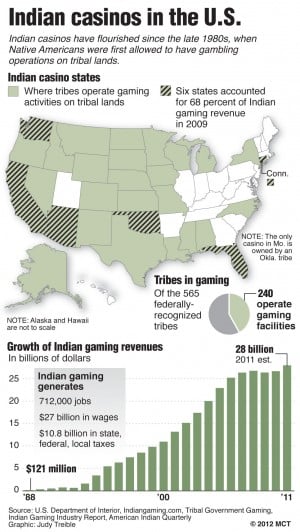Only a handful of off-reservation casinos have been approved
Posted: Saturday, July 7, 2012

Indian casinos in the U.S.
The 1988 law passed by Congress has always allowed off-reservation casinos. But they’re extremely rare, with only a handful approved by the federal government.
Backers say that dropping the “commutable distance standard” adopted by the Bush administration will lead to more off-reservation casinos and help tribes create more jobs. That, they say, is just as President Ronald Reagan and Congress envisioned when they passed the law allowing tribes to get into the big leagues of gambling.
But even some tribal officials are leery, worried that off-reservation casinos stray far from the original intent of the law, which they say clearly was aimed at keeping the casinos on reservation land.
“I think Indian gaming had good intentions — it was intended to help tribes, but there are ways that I think it can be used to get away from what its intentions were. ... We’ve been worried about off-reservation gaming,” said Chris Mercier, a tribal council member for the Confederated Tribes of Grand Ronde in Oregon. The tribe has gone to court to try to block its neighboring tribe, the once landless Cowlitz Indian Tribe of Washington state, from opening a casino on a 152-acre site it bought near La Center, Wash.
Because it still takes years to plow through the bureaucracy to actually open a casino, it’s far too soon to know whether the tribes will experience large-scale success in moving beyond their borders.
But the early signs are telling.
In California, gambling opponents say the new approach already has resulted in a flood of new applications for tribes to acquire more property. The Bureau of Indian Affairs would not disclose how many applications it has received in other states or across the country and has yet to respond to a formal request for the data, filed in May by McClatchy Newspapers under the federal Freedom of Information Act.
Backers say that dropping the “commutable distance standard” adopted by the Bush administration will lead to more off-reservation casinos and help tribes create more jobs. That, they say, is just as President Ronald Reagan and Congress envisioned when they passed the law allowing tribes to get into the big leagues of gambling.
But even some tribal officials are leery, worried that off-reservation casinos stray far from the original intent of the law, which they say clearly was aimed at keeping the casinos on reservation land.
“I think Indian gaming had good intentions — it was intended to help tribes, but there are ways that I think it can be used to get away from what its intentions were. ... We’ve been worried about off-reservation gaming,” said Chris Mercier, a tribal council member for the Confederated Tribes of Grand Ronde in Oregon. The tribe has gone to court to try to block its neighboring tribe, the once landless Cowlitz Indian Tribe of Washington state, from opening a casino on a 152-acre site it bought near La Center, Wash.
Because it still takes years to plow through the bureaucracy to actually open a casino, it’s far too soon to know whether the tribes will experience large-scale success in moving beyond their borders.
But the early signs are telling.
In California, gambling opponents say the new approach already has resulted in a flood of new applications for tribes to acquire more property. The Bureau of Indian Affairs would not disclose how many applications it has received in other states or across the country and has yet to respond to a formal request for the data, filed in May by McClatchy Newspapers under the federal Freedom of Information Act.
http://www.heraldandnews.com/article_9d0ca1f2-c8c5-11e1-bf2b-0019bb2963f4.html



No comments:
Post a Comment